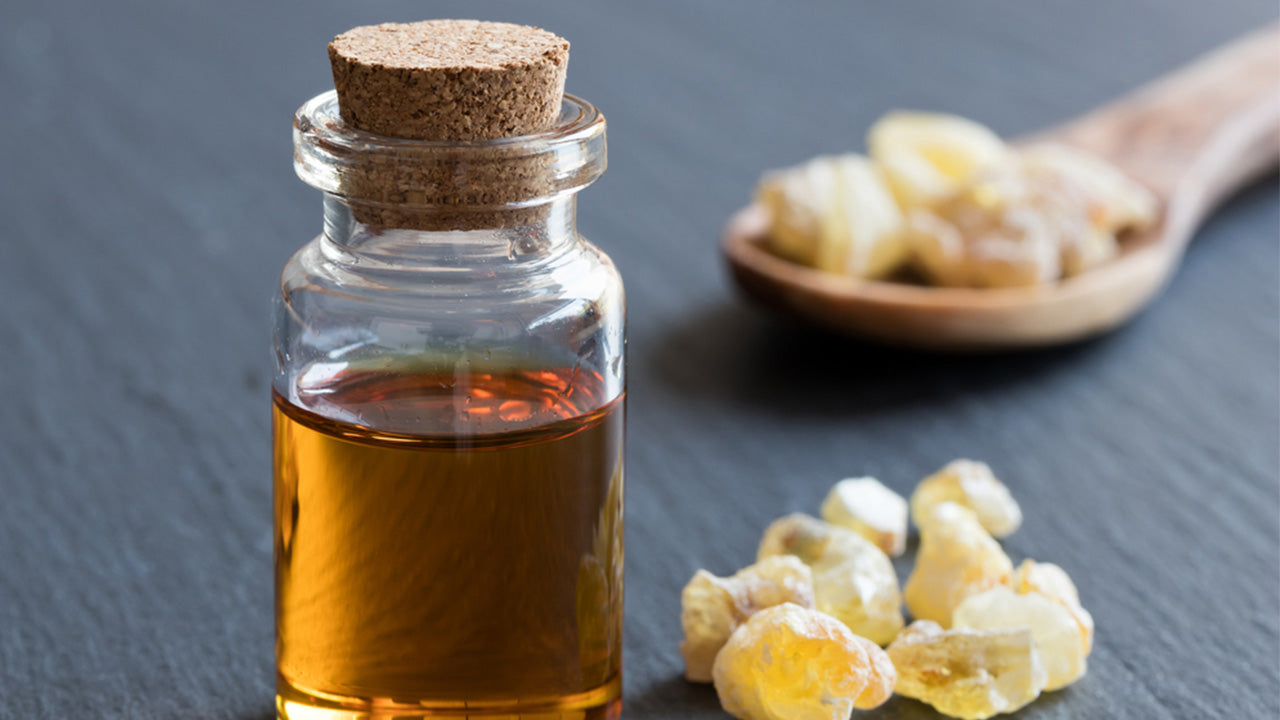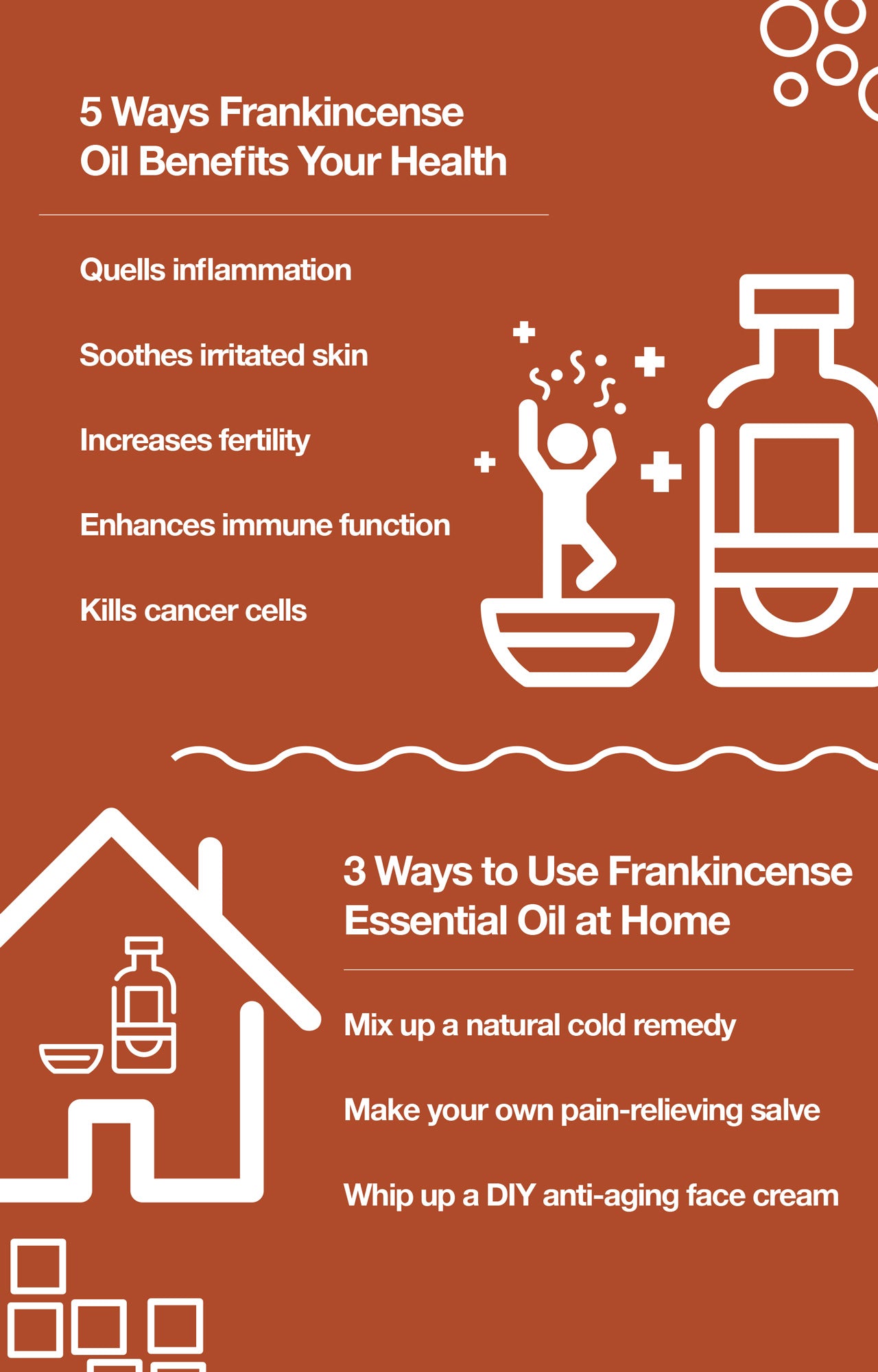5 Frankincense Oil Benefits Scientists Want You to Know
 By: by Amino Science
By: by Amino Science

If you’re interested in natural health, you may already be familiar with some of the ways essential oils can benefit your health—for instance, treating headaches. Essential oils like frankincense have been used around the world for centuries to treat a wide variety of conditions. Scientific advances have now made it possible for researchers to identify why certain oils can so effectively resolve specific issues. The National Institute of Health’s U.S. National Library of Medicine database lists over 200 clinical trials on the benefits of essential oils for conditions such as anxiety, high blood pressure, chronic pain, and more. In this article, we’ve highlighted five frankincense oil benefits we find especially compelling, as well as a few frankincense oil uses you can try at home.
What Is Frankincense?
The word “frankincense” comes from the old French phrase “franc encens” and means high-quality or pure incense. Frankincense has been used as an aromatic incense since ancient times, often during religious ceremonies. Its association with Christianity in particular is strengthened by the fact that the bible mentions it as one of the gifts the three wise men brought to the infant Jesus.
Frankincense, also called olibanum, comes from the resin of the Boswellia trees that grow natively in Somalia and parts of Pakistan. This aromatic substance is transformed into incense, perfume, and frankincense essential oil, which is made via steam distillation of the dry resin.
Studies show that Boswellia resin contains compounds with impressive anti-inflammatory—and potentially, anti-carcinogenic—effects. The main active compounds found in Boswellia resin and frankincense oil include alpha-pinene, actanol, bornyl acetate, linalool, octyl acetate, incensole, and incensole acetate.

Natural health practitioners have long relied on frankincense as a means of relieving inflammation as well as warding off illness. Findings published in the International Journal of Nutrition, Pharmacology, and Neurological Diseases include the following traditional uses for frankincense:
- Cure upper respiratory infections and urinary tract infections (UTIs)
- Relieve menstrual pain
- Treat gum, mouth, and throat complaints
- Ease depression
- Speed healing of wounds and sores
- Soothe ulcers and hemorrhoids
- Ease arthritis symptoms
As scientists have investigated the chemical composition and effects of frankincense, they’ve found evidence to support its use for many of those purposes.
5 Proven Frankincense Oil Benefits
Due to the variety of powerful bioactive compounds it contains, frankincense has a multitude of exciting health benefits. We collected five that are backed by high-quality scientific findings.

1. Quells Inflammation
There’s plenty of solid evidence on frankincense’s ability to quell inflammation. Researchers believe that the frankincense compounds with the strongest anti-inflammatory properties are pentacyclic triterpenes of the boswellic acid type. Studies show that frankincense prevents the growth and proliferation of leukotrienes, molecules known to perpetuate chronic inflammatory diseases such as:
- Rheumatoid arthritis
- Chronic colitis
- Ulcerative colitis
- Crohn's disease
- Bronchial asthma
- Peritumoral brain edema
2. Soothes Irritated Skin
A review published in the Journal of Traditional and Complementary Medicine mentions several studies on frankincense oil benefits for skin, including reducing redness and irritation, producing a more even skin tone, and speeding the healing time for bruises and infected sores.
These effects are also thought to be due to pentacyclic triterpenes, the anti-inflammatory compounds mentioned in the last section.
If you’re interested in using frankincense essential oil on your skin, be sure to dilute it first by mixing it into a carrier oil.
3. Increases Fertility
Though large-scale studies on this benefit have yet to be conducted with human subjects, frankincense appears to be a wonderful natural fertility aid.
One study conducted with rats examined how frankincense affects the reproductive system and fertility. The authors found that oral doses of frankincense boosted fertility, leading to a greater number of successful egg fertilizations and implantations as well as an increase in the number of viable fetuses. They believe these effects may be due to increased sperm motility and density.
It appears that frankincense oil acts on the pituitary gland to increase the main hormones involved in the production of sperm, but further investigation is needed to confirm the mechanism of action.
4. Enhances Immune Function
Studies show that frankincense can help your immune system combat the threats posed by outside invaders such as bacteria and viruses.
According to findings published by researchers from the Department of Pharmacognosy at Mansoura University in Egypt, frankincense demonstrates “strong immunostimulant activity.” Immunostimulants activate your body’s natural defense system, ensuring it responds promptly to prevent illness from developing.
5. Kills Cancer Cells
Many researchers believe frankincense has the potential to be a formidable natural cancer treatment.
Traditional Chinese Medicine (TCM) practitioners use frankincense to prevent and treat cancer. Findings published in 2014 show that frankincense is involved in a number of different mechanisms that cause cancer cell death.
A German study showed that a chemical compound found in frankincense can even kill cancer cells that have become resistant to chemotherapy.
Try These Frankincense Oil Uses at Home
Like other essential oils, frankincense can be inhaled or applied topically. The medicinal benefits of aromatherapy are premised on the idea that all the organs in the body are linked to the olfactory system, so when we inhale the active compounds in frankincense essential oil, they can travel to the brain and to the entire body via the respiratory system.
Here are three ways you can access the impressive benefits of frankincense oil at home.
1. Mix Up a Natural Cold Remedy
If you feel the beginnings of a cold or even the flu setting in, you can use frankincense oil to ease your symptoms. It acts as an expectorant, helping to eliminate phlegm from your lungs. Its anti-inflammatory properties also soothe swollen nasal passages, making it easier to breathe. Plus, since it’s an immunostimulant, it can help you recover faster.
Try sprinkling a few drops on a warm, damp washcloth and draping it over your face. Or if you have an oil diffuser, add a few drops and inhale the vapors deeply.
2. Make Your Own Pain-Relieving Salve
If you’re dealing with joint pain related to conditions like arthritis or resulting from old injuries, frankincense essential oil can help. Add a few drops to a carrier oil—coconut oil is a great choice—and rub the mixture into whichever areas are currently inflamed. You can also add frankincense oil to steaming water and create a hot compress to wrap up aching wrists, knees, or ankles.
3. Whip Up a DIY Anti-Aging Face Cream
Frankincense can enhance the health and appearance of your skin in a variety of ways, from reducing acne blemishes to shrinking enlarged pores. Some of its most exciting effects have to do with its anti-aging ability to prevent wrinkles and lift and tighten skin to keep your skin looking youthful and firm as you age.
A simple way to use frankincense for this purpose is to add 6 drops to 1 ounce of the carrier oil of your choosing. As with any new skincare product, it’s smart to do a patch test first in case of an allergic reaction.
We love that you're interested in and taking advantage of natural at-home therapeutics to help you feel better and live healthier. To optimize your wellness even further, we recommend Life, an anti-aging essential amino acid supplement that helps keep your heart and muscles strong with every passing day.

Up to 25% off Amino
Shop NowTAGS: natural cures
Join the Community
Comments (0)
Most Craveable Recipes




 833-264-6620
833-264-6620



















